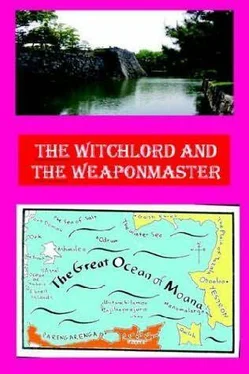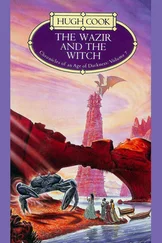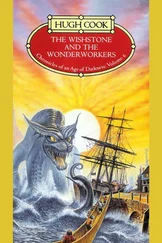Hugh Cook - The Witchlord and the Weaponmaster
Здесь есть возможность читать онлайн «Hugh Cook - The Witchlord and the Weaponmaster» весь текст электронной книги совершенно бесплатно (целиком полную версию без сокращений). В некоторых случаях можно слушать аудио, скачать через торрент в формате fb2 и присутствует краткое содержание. Жанр: Фэнтези, на английском языке. Описание произведения, (предисловие) а так же отзывы посетителей доступны на портале библиотеки ЛибКат.
- Название:The Witchlord and the Weaponmaster
- Автор:
- Жанр:
- Год:неизвестен
- ISBN:нет данных
- Рейтинг книги:5 / 5. Голосов: 1
-
Избранное:Добавить в избранное
- Отзывы:
-
Ваша оценка:
- 100
- 1
- 2
- 3
- 4
- 5
The Witchlord and the Weaponmaster: краткое содержание, описание и аннотация
Предлагаем к чтению аннотацию, описание, краткое содержание или предисловие (зависит от того, что написал сам автор книги «The Witchlord and the Weaponmaster»). Если вы не нашли необходимую информацию о книге — напишите в комментариях, мы постараемся отыскать её.
The Witchlord and the Weaponmaster — читать онлайн бесплатно полную книгу (весь текст) целиком
Ниже представлен текст книги, разбитый по страницам. Система сохранения места последней прочитанной страницы, позволяет с удобством читать онлайн бесплатно книгу «The Witchlord and the Weaponmaster», без необходимости каждый раз заново искать на чём Вы остановились. Поставьте закладку, и сможете в любой момент перейти на страницу, на которой закончили чтение.
Интервал:
Закладка:
"You were of the Yarglat in your youth, were you not?" said they.
"So I am told," said Eljuk. Then, venturing on a blatant lie to preserve himself from dissection: "But I was taken from those barbarous realms when I was but a baby, hence have no memory of them. But – but some little I have heard. When Guest spoke of strawberries and such, he spoke by way of euphemism. For cream read blood, and for strawberries read the organs of sacrificial victims."
"Brother!" said Guest, evincing shock. "These things are not to be spoken of in the presence of the unclean!"
The ethnologists were delighted, and in particular they were exceedingly pleased by Guest Gulkan's shock. For it is counted a great feat of ethnology to penetrate to the most secret, sensitive part of an alien culture, then display the intimacies of those secrets for public view, like the organs of a dead chicken.
Finally, the ethnologists compelled Guest Gulkan to undress for him, so that his physique might be sketched. For they had observed the largeness of his flap-handle ears, and wondered whether other organs might be similarly distended.
The undressing of the Weaponmaster – a grievous breach of the taboos of the Yarglat, but one which he was past caring about – proved him to be uncommonly battered and scarred. It also proved him to be in possession of an amulet, the mazadath which he had come by in Dalar ken Halvar.
"What is that?" said Brother Fern Feathers, the wizard who headed the Ethnological Commission.
"It is the liver of a dog," said Guest.
"A dog!?" said Fern Feathers.
"Yes, yes, a dog," said Guest. "An iron dog, a dog of a kind known as a dorgi. I slaughtered the thing in Dalar ken Halvar, hacked it with my sword then gulleted its ruins with my fingernails. It is from that corpse which I have this prize of mine."
Naturally the wizards did not believed this farraginous mix of fact and fantasy, so examined Guest's amulet. But they dismissed it as a trinketing piece of silverwork, though a proper Investigation would have proved its metal to be much, much harder than silver.
"It is a pretty thing," said Fern Feathers, giving a final verdict on the mazadath, "but it has no potency."
This was true, at least as far as wizards were concerned, and so they left the thing in Guest Gulkan's possession, having done no more than sketch it for their ethnological records.
With his interrogation at last at an end, Guest Gulkan was able to exercise his own ethnological curiosity by first participating in and then spectating at the trial of Hostaja Torsen Sken-Pitilkin, which was presided over by three judges.
Those judges were all wizards of Arl: being Heenmor, Phyphor and Garash. It may be argued that the last-named was still technically an apprentice. However, though Garash had not yet been released from the service of his master Phyphor, he still commanded a wizard's full powers.
It would be a grievous labor to recount in full the laborious processes of a trial of a wizard by wizards. It was a trial of truly historical length, and most of it was spent arguing points of law.
The bare facts of the case may be stated with the utmost simplicity. Sken-Pitilkin was accused of high treason, in that he had aided and abetted certain enemies of the Empire of Wizards, those enemies being things belonging to or allied with the Sisterhood of Witches. It was said that the witch Zelafona had fled from the justice of the Empire of Wizards. Fleeing in company with the dwarf Glambrax and the wizard Zozimus, the witch had sheltered upon Sken-Pitilkin's home island of Drum. Shortly afterwards, Sken-Pitilkin had departed from Drum with witch, wizard and dwarf, fleeing to the northern continent of Tameran, where he made his home in the city of Gendormargensis, and earned his living as a tutor.
Those were the facts, at least as the Confederation's lawyers stated them. But Sken-Pitilkin accepted none of it, and disputed vigorously on each and every point. He was accused, was he, of aiding and abetting enemies of the Empire of Wizards? Then surely it was logical to ask – what Empire?
Running along the track of this logic, Sken-Pitilkin argued that the Empire of Wizards had fallen to ruin long generations previously, which was undeniably true as a matter of literal fact.
But the lawyers representing the Confederation argued, rather, that the Empire still existed as a legal entity, even if the Empire had entirely vanished from the world of the flesh and the fact.
With the judges deciding for the Confederation on that point, Sken-Pitilkin tried another tack. Sken-Pitilkin claimed the Confederation must prove that he had known Zozimus, Zelafona and Glambrax to have been in flight from justice.
"For," said Sken-Pitilkin, "the law does not allow you to assume me to have had such knowledge. On the contrary. You must summon your witnesses and prove it."
"We need do nothing of the kind," said the lawyers in opposition to him. "For common sense does all the proving the law requires."
"Common sense!" said Sken-Pitilkin, scandalized. "Since when has common sense had anything to do with the operation of the law?
Ten thousand years of legal tradition deny the legitimacy of common sense! Will your set yourself against such tradition?"
But his enemies were unmoved. They claimed that the mere application of common sense was sufficient to prove that Sken-Pitilkin – whom all of them knew of old – would never have left Drum except under dire pressure. Sken-Pitilkin was a creature of habit, known to be very fond of his home island; and, furthermore, no wizard would willingly go to a place so barbarous as Tameran unless driven by extreme necessity. It followed that Sken-Pitilkin had known his guests – Zozimus, Zelafona and Glambrax – to have been criminals. By rights, he should have chopped off their feet and handed them over to the Confederation. Since he had not done so, he was guilty of treason.
"Common sense proves as much," said the chiefests of the prosecutors. Sken-Pitilkin thought this a low and scurrilous blow. To allow common sense into a case before the courts! Surely there was no precedent for such a thing! Not in all the annals of legal infamy!
But, condemned by no evidence saving that of common sense alone, Sken-Pitilkin was ultimately found guilty of high treason, and was sentenced to death.
The manner of his sentence was this: he was to seek his death by taking the thing called Shabble, and by disposing of it in the depths of the Warp, the depths beyond the Veils of Fire.
For, after long interrogation of Shabble, the wizards of the Confederation had decided that this thing was dangerous; and, not being sure as to how it might otherwise be disposed of, they had decided to consign Shabble to certain doom which waited beyond the Veils of Fire.
Chapter Forty-Six
Shackle Mountains: a range of mountains on Argan's eastern seaboard, inland from the Breach and the Bitterwater Coast. In these mountains is the Warp which apprentice wizards enter to endure the Trials which will decided whether they graduate (or whether they die). In the Warp itself lie the Veils of Fire, and no person has ever penetrated beyond those Veils and returned to tell the tale. Accordingly, the wizards of the Confederation believe that the enigmatic but doubtlessly dangerous Shabble can be destroyed by being taken beyond those Veils.
It would be a long and weary business to give an account of the process of appeal whereby Sken-Pitilkin sought to challenge his conviction for high treason. The case dragged on for years.
During that time, Ontario Nol was at liberty, since no crime could be proved out against him. He had led a blameless life, first at the monastery of Qonsajara in the mountains of Ibsen-Iktus, and later on the island of Alozay. His long but voluntary exile was regarded as eccentric, but not criminal. So Nol was assigned quarters in the Castle of Controlling Power, the great stronghold at the western end of the flame trench Drangsturm, and was allotted that portion of the Confederation's profits to which he was rightfully entitled.
Читать дальшеИнтервал:
Закладка:
Похожие книги на «The Witchlord and the Weaponmaster»
Представляем Вашему вниманию похожие книги на «The Witchlord and the Weaponmaster» списком для выбора. Мы отобрали схожую по названию и смыслу литературу в надежде предоставить читателям больше вариантов отыскать новые, интересные, ещё непрочитанные произведения.
Обсуждение, отзывы о книге «The Witchlord and the Weaponmaster» и просто собственные мнения читателей. Оставьте ваши комментарии, напишите, что Вы думаете о произведении, его смысле или главных героях. Укажите что конкретно понравилось, а что нет, и почему Вы так считаете.












